Amazon vs. Alibaba: What’s the Difference?
Download Amazon Seller Guide
This guide will help you get started, understand the basics of Amazon selling, and explain in simple words how it all works.
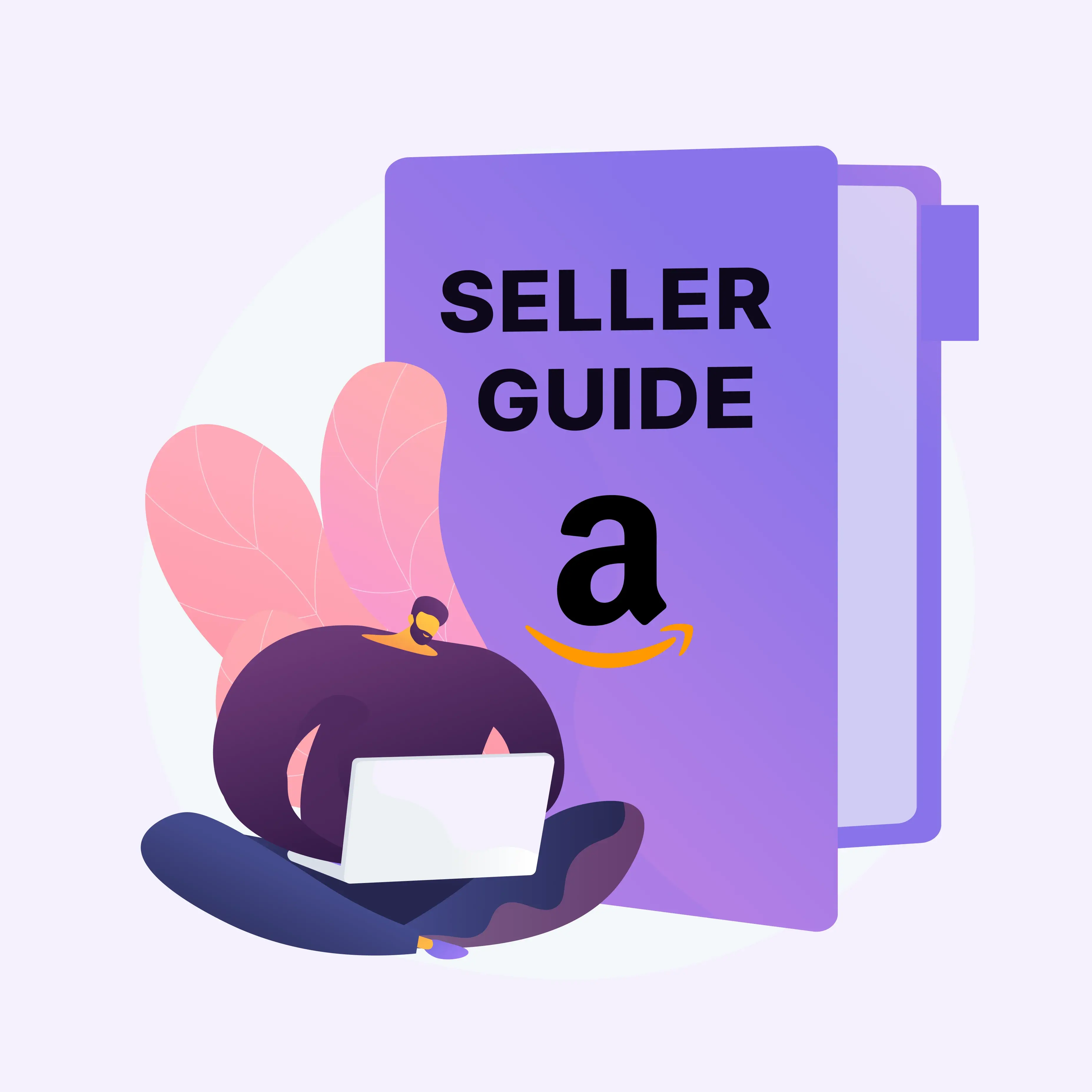
When it comes to global e-commerce giants, Amazon and Alibaba are often at the forefront of discussions. While both platforms dominate their respective markets, they cater to different needs and strategies.
While Amazon connects products with their huge customer audience, Alibaba connects sellers and businesses that sell their products. Understanding the key differences between Amazon and Alibaba helps sellers looking to expand their business use both e-commerce platforms in the right way.
In this post, we'll break down how these two powerhouses differ, and help you understand how they can help you grow sales.
What Is Amazon?
Amazon is one of the largest and most popular e-commerce platforms in the world, offering a vast marketplace where individuals and businesses can sell their products directly to consumers.
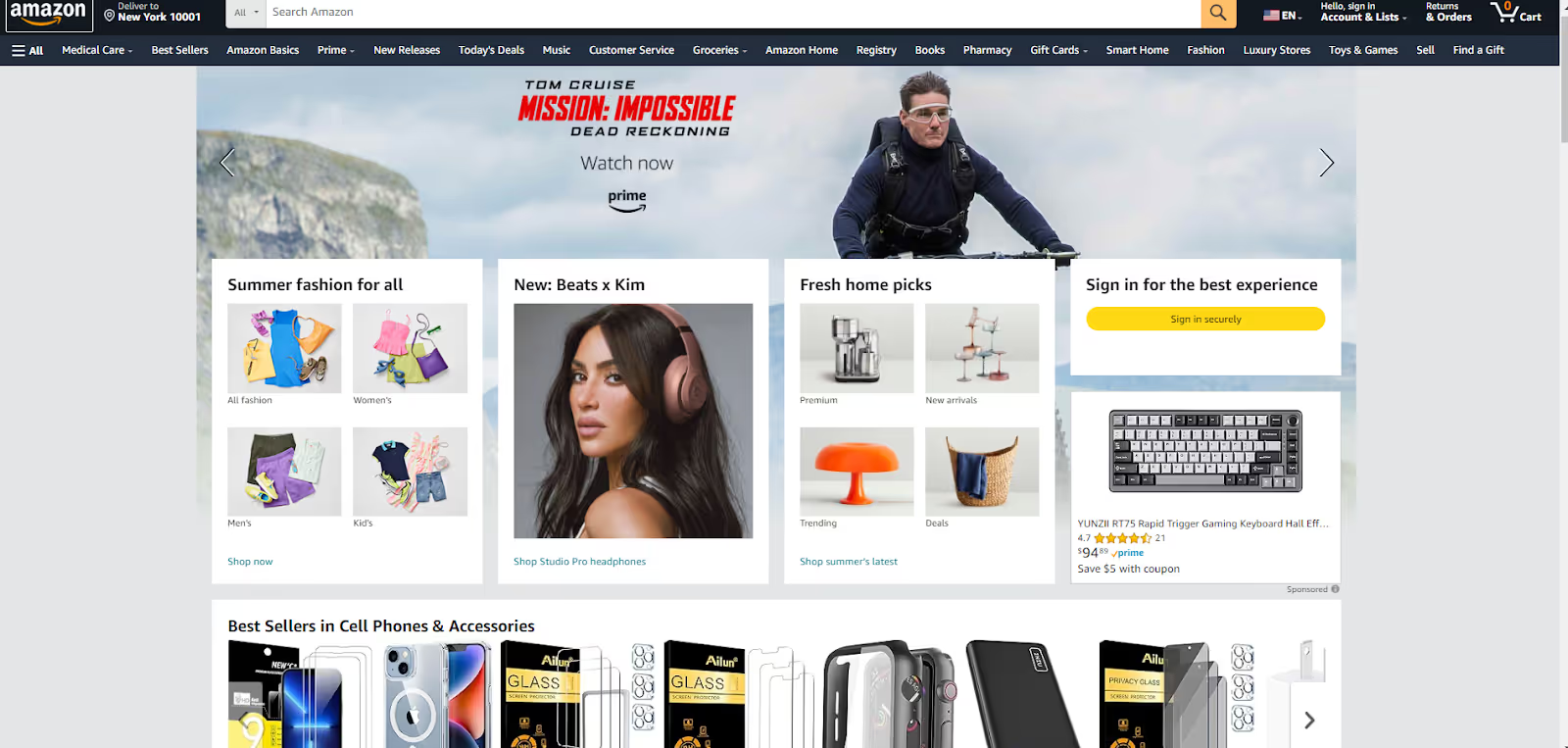
For sellers, Amazon represents an opportunity to leverage one of the most powerful e-commerce platforms in the world to grow their business. However, it requires a lot of learning because the way you sell on Amazon differs from other ecommerce businesses.
With over 310 million users and around 2.3 million active sellers globally, Amazon offers a huge customer base but it is also one of the most competitive and sophisticated ecommerce platforms.
Amazon for sellers
Global marketplace
- Reach
Amazon provides access to a global audience, allowing sellers to reach millions of customers across various countries.
- Platform
Sellers can list their products on Amazon’s marketplace, where they are searchable by a vast number of potential buyers.
Seller services
Sellers can use Amazon's fulfillment centers to store, pack, and ship products, as well as handle customer service and returns. This service is particularly beneficial for sellers who want to scale their business without managing logistics.
This is the hub for managing all aspects of your Amazon business, from listing products and handling customer inquiries to tracking sales performance and inventory.
- Reporting and analytics tools
Amazon offers extensive tools and different kinds of reports that help sellers start and grow their business ranging from AI-powered listing tools and Opportunity Finder to inventory management and account health dashboards.
Competitive environment
- Pricing and competition
Amazon is highly competitive, with many sellers often offering similar products. Success often depends on finding the right products, in-depth product research, adaptive pricing strategies, and effective use of product sourcing and inventory management tools.
- Customer trust
Selling on Amazon can lend credibility and trustworthiness to your products due to Amazon's established reputation for customer service and reliability.
Fee structure
- Selling fees
Amazon charges various fees for selling on its platform, including referral fees, fulfillment fees (if using FBA), and subscription fees depending on the seller’s plan.
Sellers need to carefully manage their costs and pricing strategies to ensure profitability after accounting for Amazon’s fees.
- Policies and regulations
Amazon has strict guidelines and policies that sellers must adhere to, including product quality standards, shipping requirements, and customer service expectations. Non-compliance can result in penalties or suspension from the platform.
- Brand building and control
Amazon allows sellers to protect their brand and intellectual property through the Brand Registry, which helps reduce counterfeits and provides tools to better control their brand presence on the platform.
Pros and Cons on Amazon for Sellers
Selling on Amazon offers significant opportunities due to its massive reach and efficient fulfillment services, but it also presents challenges such as high competition and strict policies. Sellers must weigh these pros and cons based on their business model and goals to determine if Amazon is the right platform for them.
Pros of selling on Amazon
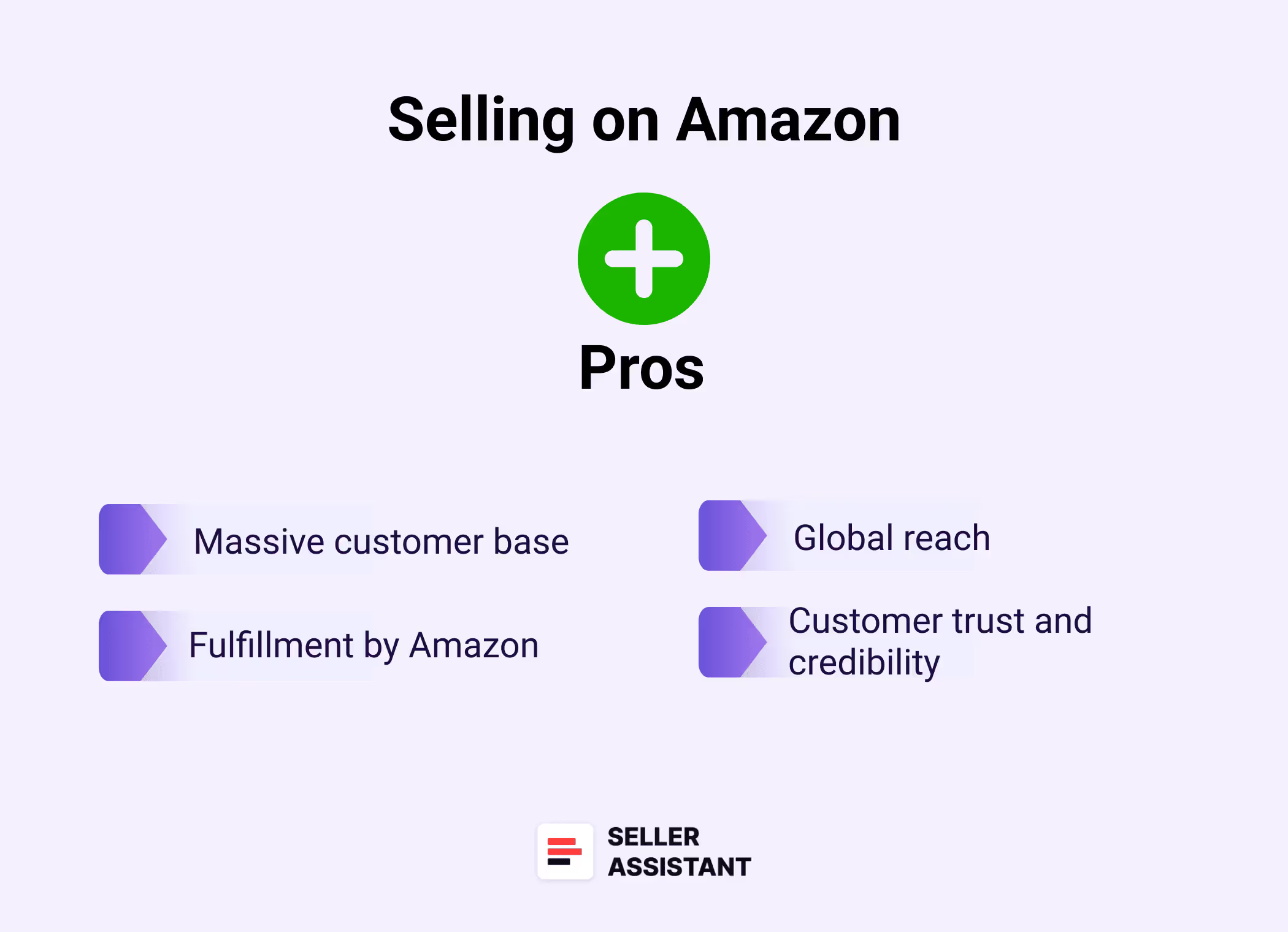
Massive customer base
Amazon boasts a vast global audience, giving sellers access to millions of potential customers. This can lead to significant sales volume if products are well-positioned.
Fulfillment by Amazon
With FBA, Amazon handles storage, packing, shipping, and customer service. This allows sellers to scale their operations without needing to manage logistics, and products become eligible for Amazon Prime, attracting more buyers.
Global reach
Amazon operates in over 21 marketplaces worldwide and reaches millions of customers in 200+ countries, enabling sellers to expand their business internationally and reach customers in new markets without having to establish a physical presence in those regions.
Customer trust and credibility
Amazon’s strong reputation enhances the credibility of sellers on its platform. Buyers often feel more confident purchasing from Amazon due to its reliable customer service and return policies.
Cons of selling on Amazon
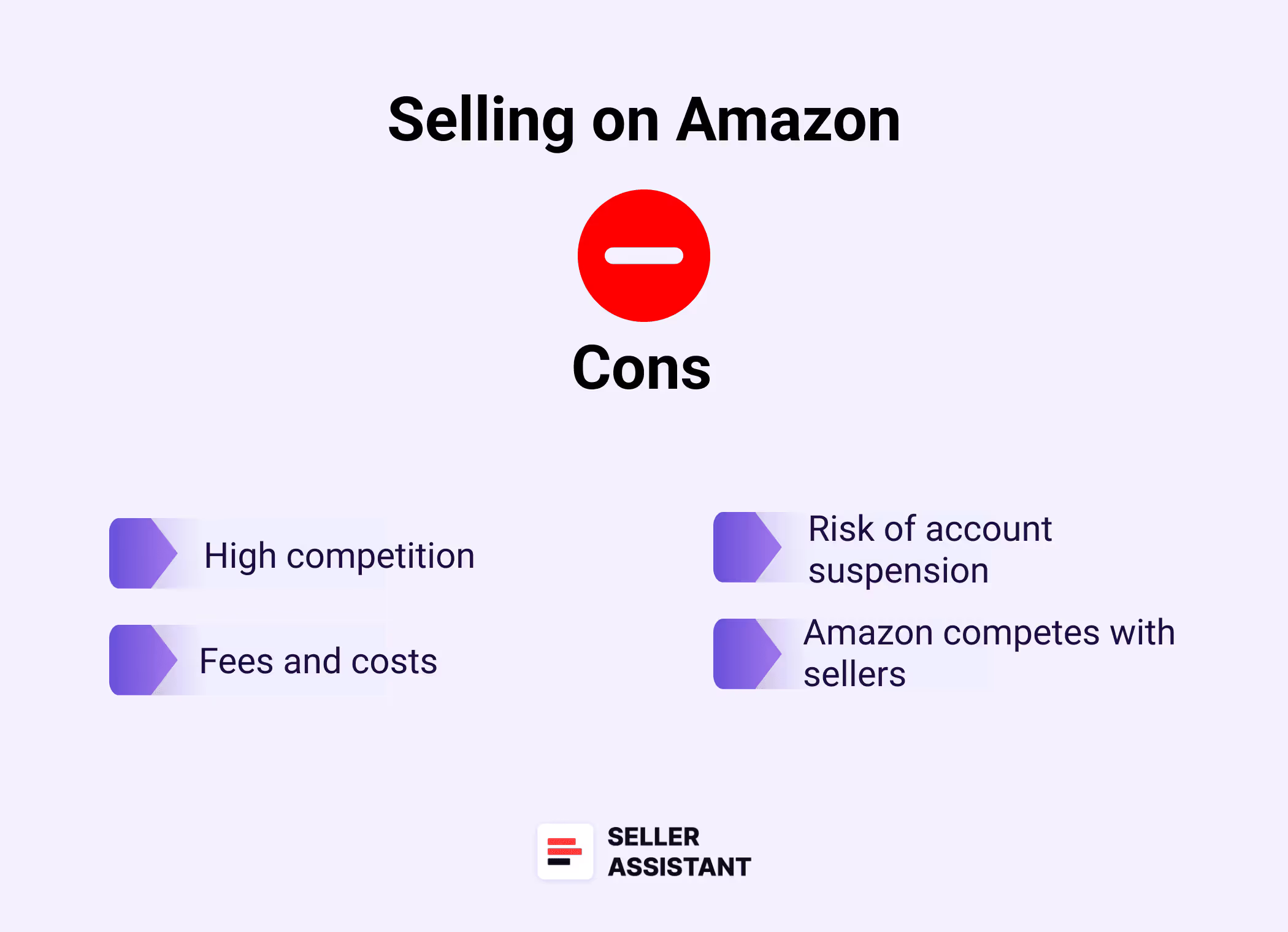
High competition
The platform is highly competitive, with many sellers often offering similar products. This can lead to price wars and slim profit margins, especially in saturated categories.
Fees and costs
Amazon charges various fees, including referral fees, FBA fulfillment fees, and storage fees. These costs can add up quickly, affecting profit margins, especially for low-cost items.
Risk of account suspension
Amazon has strict policies and complicated account health requirements and sellers must constantly monitor their Account Health Dashboards in Seller Central to stay compliant and avoid account suspension. Violations can lead to account suspension or even permanent bans. This risk can be daunting for sellers who rely heavily on Amazon for their business.
Amazon competes with sellers
Amazon can be a seller on its own platform and can heavily compete with third-party sellers. If Amazon owns the Buy Box, it’s very complicated to compete because as a huge retailer they always have the best conditions from the suppliers. On some brands, Amazon sells up to 50% of products, which makes these brands not suitable for reselling.
What Is Alibaba?
Alibaba is a leading global e-commerce platform that primarily connects manufacturers, wholesalers, and suppliers with businesses around the world. It offers a different model compared to platforms like Amazon, focusing more on business-to-business (B2B) transactions.
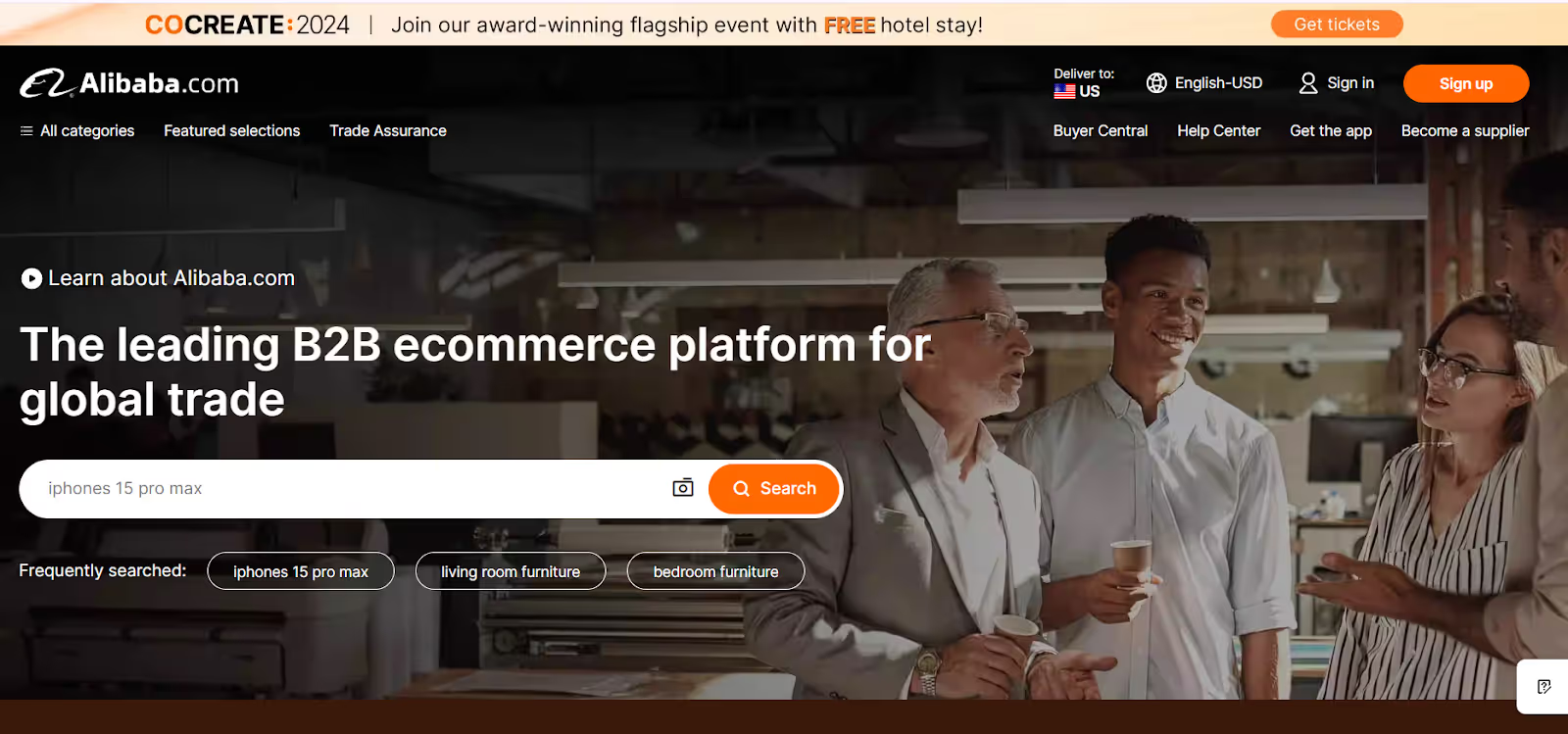
For sellers, Alibaba is an essential platform for sourcing products from global suppliers, particularly from China, involved in manufacturing, wholesale, and bulk trade. 71% of Amazon sellers source products from China in 2024, and many of these suppliers are found on Alibaba. These suppliers often offer attractive prices.
Alibaba offers a range of tools and services designed to facilitate large-scale B2B transactions, making it a powerful platform for businesses looking to expand their product offerings.
Alibaba for sellers
Global B2B marketplace
- Business focus
Unlike Amazon, which is more consumer-facing, Alibaba is a B2B marketplace where sellers connect with other businesses rather than directly with consumers. This makes it ideal for manufacturers, wholesalers, and suppliers looking to sell products in bulk.
- International reach
Sellers on Alibaba can reach suppliers from all over the world, with a lot of them from Asia, and source products at wholesale prices for resale or production.
Wholesale platform
- Large orders
The platform is designed for bulk transactions, making it ideal for sellers who produce goods in large quantities and want to sell them in bulk rather than individual units.
- Custom orders
Alibaba allows buyers to place custom orders, where sellers can provide products tailored to specific requirements, such as branding, specifications, and packaging.
Supplier and manufacturer network
- Product sourcing
Alibaba is a hub for sellers who want to source products directly from manufacturers. This is especially valuable for businesses looking to find reliable suppliers or to create private label products.
- Supplier verification
Alibaba offers verification services to help buyers confirm the legitimacy and reliability of suppliers, which in turn builds trust and credibility for sellers.
Flexible selling models
- MOQs (Minimum Order Quantities)
Sellers on Alibaba often set MOQs to ensure that transactions are worth the effort and costs involved in production and shipping, but these MOQs are typically more flexible than with the U.S or European brands.
- Trade assurance
Alibaba provides a Trade Assurance program that protects buyers by ensuring that products meet the agreed-upon quality and shipping standards, adding another layer of trust for sellers. Trade Assurance is free, however, you may be charged for a payment processing fee.
- Fee structure and costs
Alibaba doesn't charge buyers a direct fee for using their platform. To purchase products on Alibaba, you create a free account. However, if you use a credit card, Apple Pay, Google Pay, or PayPal, as a payment method, you will be charged a transaction fee of 2.99%.
- Payment solutions
Alibaba offers secure payment solutions like Alipay, which works as a mobile wallet-based payment method tied to credit cards. Alipay ensures that both buyers and sellers are protected during transactions. This builds trust and ensures smooth financial exchanges.
Pros and Cons on Alibaba for Sellers
Alibaba is a great source of product ideas used by many Amazon sellers. Sourcing products from Alibaba offers numerous advantages, including a vast selection of products, competitive pricing, and customization options.
However, sellers must be cautious of the potential risks, such as quality control issues, long shipping times, and complex international trade regulations. Conducting thorough research and building strong relationships with reliable suppliers are crucial steps for success when using Alibaba as a product source.
Pros of using Alibaba
Wide range of products
Alibaba offers an extensive variety of products across numerous categories, making it easy for sellers to find almost any product they need. This wide selection allows sellers to diversify their product offerings.
Cost-effective
Products on Alibaba are often available at lower prices compared to other sourcing options. This is particularly beneficial for sellers looking to purchase in bulk, as they can take advantage of significant discounts.
Direct access to manufacturers
Alibaba connects sellers directly with manufacturers, which can lead to better pricing and the ability to negotiate terms more effectively. It also allows for more control over the production process.
Supplier verification and secure transactions
Alibaba provides verification services for suppliers, which can help sellers identify trustworthy and reliable partners, reducing the risk of fraud or poor-quality products. This provides sellers with peace of mind when dealing with overseas suppliers. Additionally, Alibaba offers a Trade Assurance program we already mentioned. That protects buyers by ensuring that suppliers meet the agreed-upon product quality and shipping standards.
Cons of using Alibaba
Quality control issues
Quality can vary significantly between suppliers on Alibaba. Sellers may receive products that do not meet their expectations, leading to potential customer dissatisfaction and returns.
Shipping times and costs
Shipping from overseas, particularly from China, can be slow or expensive. Long shipping times can affect inventory management and customer satisfaction, especially if unexpected delays occur, while express delivery can be expensive.
Risk of counterfeit or substandard products
There is a risk of receiving counterfeit or substandard products, especially if the seller does not perform due diligence on the supplier. This can damage the seller’s reputation and result in financial losses.
Intellectual property concerns
Some suppliers on Alibaba may not adequately protect intellectual property, leading to potential issues with knockoffs or unauthorized use of designs. Sellers must be vigilant in verifying their products.
What Are the Differences Between Amazon and Alibaba?
While both Amazon and Alibaba are e-commerce giants, their focus and operations are quite different.
Amazon is more consumer-centric with a strong emphasis on direct sales and fulfillment, while Alibaba serves as a B2B platform that connects businesses across the globe, particularly those looking for wholesale and manufacturing solutions.
For online sellers, Amazon is a great sales channel to sell their products to customers, while Alibaba can be a perfect source of supplier and product ideas. Combined together, they can help grow business and increase revenues.
Key differences between Amazon and Alibaba
Business model
- Amazon
Primarily operates as a business-to-consumer (B2C) platform. It also has a significant business-to-business (B2B) segment, but its core focus is on selling products directly to individual consumers through its marketplace and online retail operations.
- Alibaba
Operates primarily as a business-to-business (B2B) platform, connecting manufacturers and wholesalers with other businesses globally. It also has business-to-consumer (B2C) and consumer-to-consumer (C2C) platforms like AliExpress and Taobao, but its core strength lies in B2B commerce.
Customer base
- Amazon
Targets individual consumers looking for a wide range of products, from everyday essentials to high-end electronics. Amazon also appeals to small and large businesses through its Amazon Business platform.
- Alibaba
Targets businesses seeking to source products in bulk or at wholesale prices. Its primary users are manufacturers, wholesalers, and retailers who purchase large quantities of goods for resale or use in production.
Fulfillment services
- Amazon
Offers Fulfillment by Amazon, where sellers can store their products in Amazon’s warehouses. Amazon then handles packaging, shipping, customer service, and returns. This service is a major part of Amazon’s value proposition to sellers.
- Alibaba
Does not provide fulfillment services like Amazon’s FBA. Instead, it acts as a platform where buyers and sellers negotiate terms, including logistics. However, Alibaba has partnerships with logistics providers to assist with international shipping.
Product offering
- Amazon
Offers a wide range of products, including new and used items across numerous categories. The platform is known for its vast selection, fast delivery times, and consumer-centric approach.
- Alibaba
Specializes in bulk products, often unbranded or private-label, sourced directly from manufacturers. It’s a go-to platform for businesses looking for wholesale pricing and customized products.
Geographic focus
- Amazon
Strongest in North America and Europe, with a significant presence in several other regions. Amazon directly manages its operations and fulfillment centers in the countries where it operates.
- Alibaba
Dominates the Chinese market and has a strong presence in other Asian countries. Alibaba focuses more on facilitating global trade, especially between China and the rest of the world, rather than managing operations in individual countries.
Revenue model
- Amazon
Generates revenue through direct sales of products, commissions on third-party sales, subscription services like Amazon Prime, and advertising on its platform.
- Alibaba
Primarily earns revenue through transaction fees, membership fees (especially for premium services like Gold Supplier), and advertising services. Alibaba does not typically sell products directly; instead, it facilitates transactions between buyers and sellers.
Payments and financial services
- Amazon
As an Amazon seller, you pay $39.99 for a Professional selling plan, or $0.99 per sale. Additionally, you pay a referral fee which varies across different categories (15% on average). If you use FBA, you pay fulfillment and storage fees for Amazon’s fulfillment services. Amazon manages all payments through its platform, offering a seamless checkout experience for consumers. Amazon also provides financing options for sellers and customers.
- Alibaba
As a buyer on Alibaba, creating a buyer account is free. However, you pay a transaction fee based on how you pay your supplier. Using a wire transfer costs about $40, while using a credit card, PayPal, Google Pay, or Apple Paywill cost you a 2.99% fee. Alibaba facilitates payments through its own payment gateway, Alipay, which is used extensively in China. For international transactions, Alibaba supports various payment methods but leaves more responsibility to buyers and sellers to agree on terms.
How to Use Amazon and Alibaba in Reselling Business?
Amazon and Alibaba can be used to source and sell products in a reselling business. By combining Amazon and Alibaba, you can source products at competitive prices, and sell them to a wide Amazon audience, and capitalize on the price difference.
Strategies to choosing products for Amazon from Alibaba
Identifying the best products to sell on Amazon from Alibaba can be a daunting process. However, using product software, Seller Assistant can essentially simplify the task. There are two main strategies you can adopt, depending on whether you're purchasing in bulk or looking for individual items.
Note. Seller Assistant is a comprehensive product-sourcing software that helps Amazon sellers quickly find high-profit deals. It combines two extensions: Seller Assistant Browser Extension, and IP-Alert Chrome Extension by Seller Assistant, Amazon seller tools: Bulk Restrictions Checker and UPC/EAN to ASIN converter, and features: Side Panel View, FBM&FBA Profit Calculator, Quick View, Seller Spy, Stock Checker, IP Alert, and Restrictions Checker.

Strategy 1. Supplier to Amazon / reverse sourcing
- Identify a supplier
This approach is ideal for wholesale sellers. To buy in bulk wholesale sellers engage with Alibaba suppliers to obtain price lists containing hundreds or even thousands of products. These price lists are a goldmine for discovering new product ideas, although pinpointing profitable opportunities can be challenging.
- Find profitable deals on the supplier price list
When you’ve chosen a suitable supplier, contact them and get a price list. Supplier price lists typically contain a lot of products, and up to 70% of them can be unsuitable for selling on Amazon for various reasons. To streamline identifying profitable deals, utilize Seller Assistant's Price List Analyzer.

Simply upload your supplier's price list into the tool, which will automatically match the products to their corresponding Amazon listings, calculate profitability, and provide essential metrics such as ROI, BSR, Buy Box price, and Amazon fees.
This method allows you to quickly identify lucrative products to sell. You can filter the results by profitability or other important metrics to uncover the best deals.
Strategy 2. Amazon to Supplier / direct sourcing
This strategy involves identifying popular products on Amazon and then finding suppliers who can offer them at lower prices. This approach is commonly used by online arbitrage sellers and dropshippers, who capitalize on price differences between various retailers by purchasing low and selling high.
Places to find popular products on Amazon
Showcases the most popular products on Amazon, indicating high demand items.
Highlights products with the biggest sales growth in the past 24 hours, helping you spot trending items.
Lists newly added products on Amazon, allowing you to discover fresh and innovative offerings.
Displays products frequently added to wishlists, signaling high customer interest but not yet widely purchased.
- Finding product suppliers
Once you've identified potential products on Amazon, the next step is to find a supplier offering these items. Open the product listing on Amazon and use Seller Assistant’s Lookup Links. Select Alibaba, and Lookup Links will present you with all Alibaba supplier options.
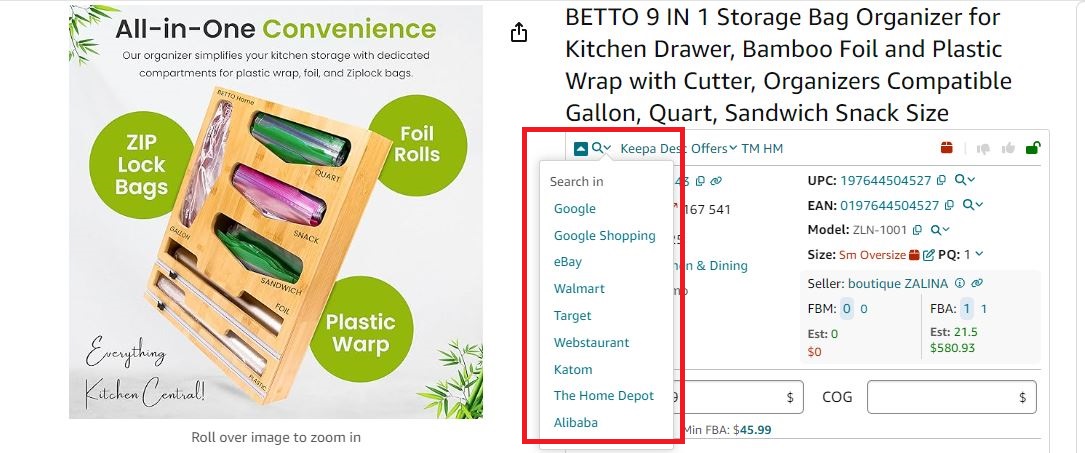
Next, conduct a thorough comparison by researching the supplier’s website, comparing the products side-by-side with those on Amazon, and calculating profitability using Seller Assistant’s Side Panel View. To activate this feature, highlight the product title on the supplier’s website, right-click, and select “Search with Seller Assistant” from the context menu. The tool will then display all product offers along with key metrics.

Final Thoughts
Amazon and Alibaba are both valuable platforms for sourcing and selling products. By leveraging Alibaba to find competitively priced products and selling them to Amazon’s vast customer base, you can take advantage of the price differential.
While selecting the right products from Alibaba to sell on Amazon can be challenging, using tools like Seller Assistant can significantly streamline the process.
Seller Assistant automates and connects every stage of your Amazon wholesale and arbitrage workflow. It brings together in one platform: workflow management tools – Purchase Orders Module, Suppliers Database, Warehouses Database, bulk research & sourcing tools – Price List Analyzer, Bulk Restriction Checker, Sourcing AI, Brand Analyzer, Seller Spy, Chrome extensions – Seller Assistant Browser Extension, IP-Alert Extension, and built-in VPN by Seller Assistant, and integrations & team access features – seamless API connectivity, integrations with Zapier, Airtable, and Make, and Virtual Assistant Accounts.
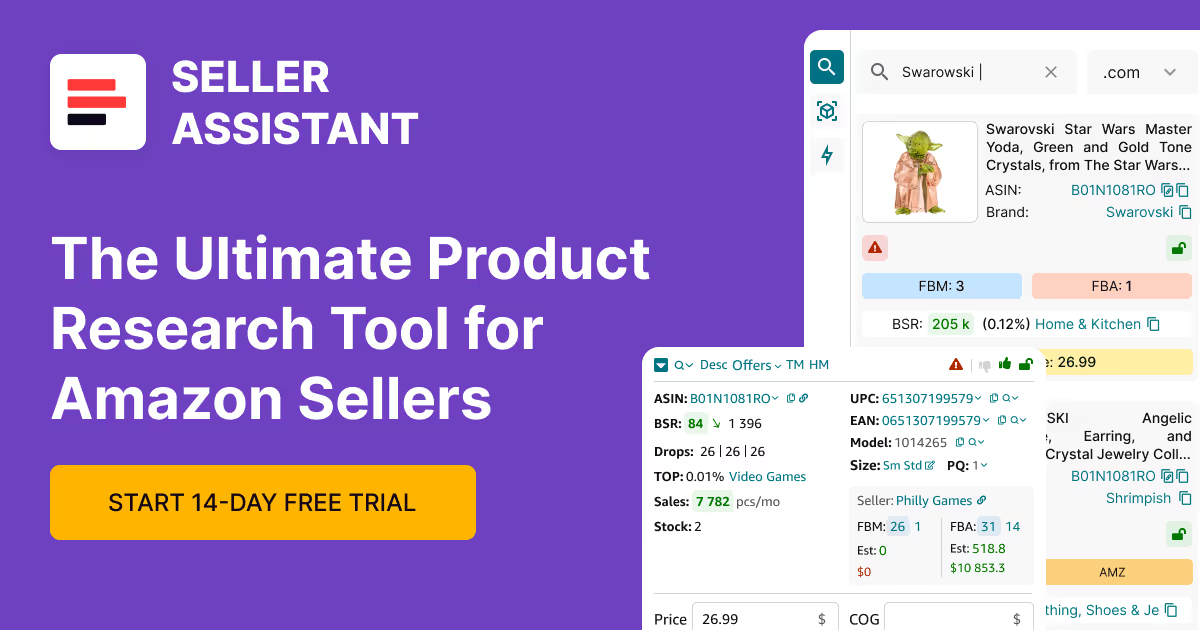
.svg)













